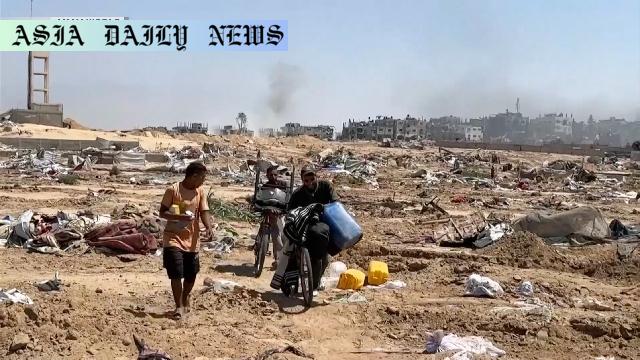Palestinian Displacement: The US opposes the involuntary relocation of Palestinians in Gaza, citing international law violations.
The US opposes forced displacement of Palestinians from Gaza.
Israel’s plan has drawn international criticism over legality.
The UN has condemned forced relocation citing international law.
Civilian casualties in Gaza increase amid food site clashes.

Opposition to Forced Palestinian Displacement
The acting United States representative to the United Nations, Ambassador Dorothy Shea, has unequivocally stated that the United States opposes the forced displacement of Palestinians from Gaza. This statement comes in response to a controversial plan, attributed to Israeli Prime Minister Benjamin Netanyahu, which proposed resettling Palestinian residents. The US has clarified its stance, emphasizing that any relocation measures should be voluntary and respect international humanitarian principles.
The plan, initially mentioned by former US President Donald Trump during a meeting with Netanyahu in February, has faced consistent criticism. Ahead of the UN Security Council meeting, Ambassador Shea reaffirmed, “The United States does not support the forced displacement of Palestinians from Gaza.” The statement underscores the country’s focus on upholding international legal standards in managing regional tensions and humanitarian crises.
UN and Global Backlash against Forced Relocation
International responses to the proposal have strongly criticized its implications. The United Nations, along with prominent Middle Eastern nations, flagged the plan as a violation of international law. It warned that forcibly removing Palestinians from Gaza sets a dangerous precedent and undermines the fundamental rights of vulnerable populations. Concerns over potential human rights violations have amplified global protests against the plan, with critics labeling it unethical and counter-productive for fostering peace in the region.
Additionally, forced resettlement plans have raised alarm among humanitarian organizations. Activists argue that dislocating vulnerable communities worsens socio-economic vulnerabilities, especially in a conflict-ridden zone like Gaza, where access to food, healthcare, and basic resources is already precarious. The UN has stressed that “relocation must align with human dignity and compliance with international agreements.”
Rising Civilian Casualties and Aid Challenges
The humanitarian crisis in Gaza continues to escalate. Recent reports indicate an alarming surge in civilian casualties around food distribution centers run by a US-led aid organization. The ongoing violence—coupled with Israeli military actions—has contributed to growing unrest. Amid this backdrop, Ambassador Shea defended Israeli actions, claiming their military has undertaken concerted efforts to minimize civilian harm during operations.
While Shea commended Israeli authorities for their “ongoing efforts,” she also directed criticism toward the United Nations for turning down collaborative initiatives involving the Gaza Humanitarian Foundation. The remarks suggest underlying tensions between international organizations and the US over approaches to addressing humanitarian concerns in Gaza. These challenges highlight the urgent need for coordinated global interventions to navigate the complex web of humanitarian aid, security concerns, and political dynamics affecting Gaza.
The Path Forward: Balancing Aid and Diplomacy
As debates regarding forced displacement intensify, stakeholders must prioritize sustainable solutions that guarantee security, territorial integrity, and human dignity. The US’s official resistance to forced relocation marks a significant step in acknowledging international sensitivities around the issue. However, achieving long-term stability requires stronger dialog between Israeli authorities, Palestinian representatives, and global mediators to forge diplomatic resolutions rooted in fairness and mutual respect.
Ultimately, the region’s future hinges on devising inclusive policies that address root causes of conflict—not just symptoms. Comprehensive strategies must extend beyond food programs and military interventions to tackle systemic issues like unemployment, educational barriers, and restricted mobility. Such actions pave the way for a more resilient Gaza and a durable peace framework.



Commentary
Acknowledging the US Stance on Displacement
The United States’ recent declaration rejecting the forced displacement of Palestinians is a meaningful development, reflecting its commitment to fostering humanitarian stability in contested regions like Gaza. By opposing plans that could potentially violate both international law and people’s inherent rights, the US distances itself from controversial measures with far-reaching implications. This stance not only underscores adherence to global norms but also signals a more balanced approach to intricately entangled regional politics.
Addressing the Intersection of Humanitarian Aid and Politics
However, the broader humanitarian crisis unfolding in Gaza demands more than statements of opposition. Civilian casualties around food distribution centers are alarming indicators of the fragile reality on the ground. The rising death toll reveals the pressing need for stronger mechanisms to safeguard vulnerable populations amidst conflicts. While Ambassador Shea referenced efforts by Israeli forces to reduce civilian harm, longstanding critiques about disproportionate action or accountability still persist. These concerns must be addressed to build trust within and beyond Gaza.
The Need for Inclusive and Sustainable Solutions
Ultimately, diplomatic solutions must take center stage. Stakeholders, including Israel, Palestine, the US, and international organizations, must collaborate to establish policies preventing displacement while ensuring access to aid and safety. It is also vital to create avenues for addressing long-term developmental needs—such as education and infrastructure—to reduce dependency on external support over time.
The unfolding Gaza crisis serves as a broader reminder: peace and progress require collective commitment, transparency, and respect for basic human dignity. The world community’s response will play a defining role in shaping Palestine’s future trajectory.